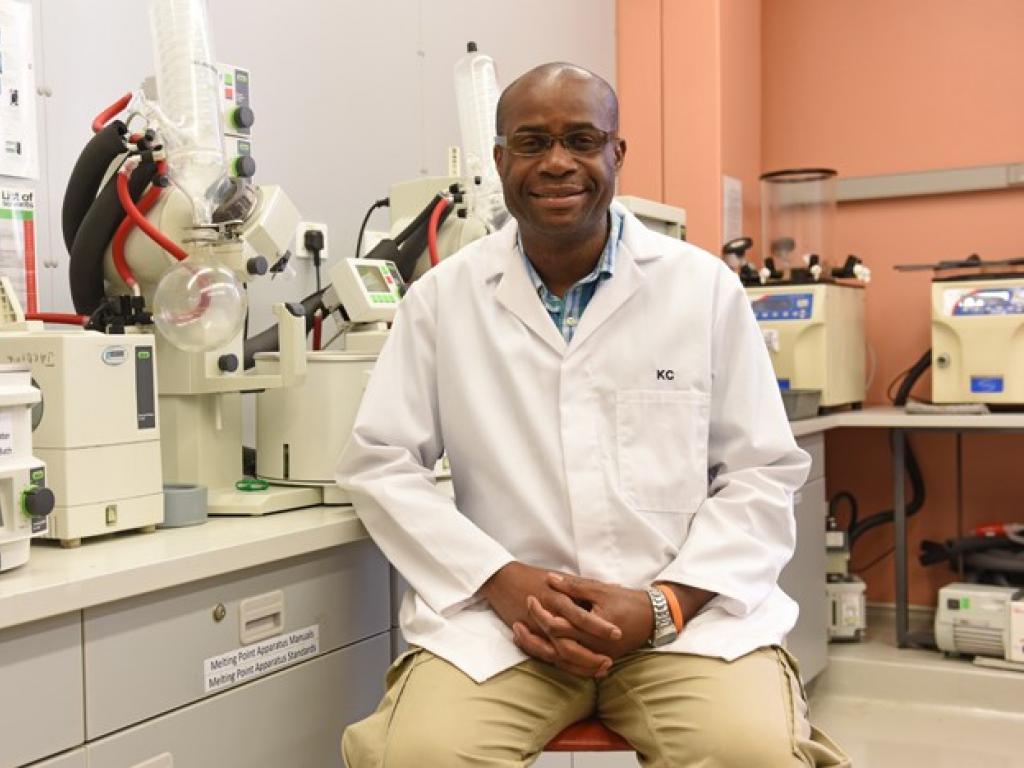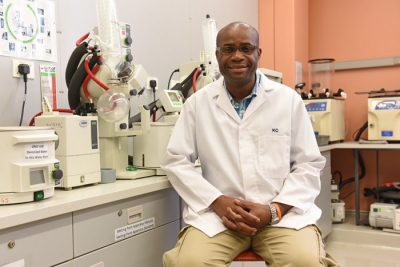Invest in science jobs for Africa


Professor Kelly Chibale. photo: Michael Hammond
Leading African researcher Professor Kelly Chibale has called for a deep commitment to investing in world-class infrastructure and skills to enable scientists to succeed on the continent.
Chibale, the founder and director of Africa’s only integrated Drug Discovery and Development Centre (H3D), at the University of Cape Town (UCT), said scientific progress in Africa is being hampered by a lack of world-class scientific infrastructure.
In his keynote address to the fifth Science in Africa UnConference in London, hosted by international NGO Planet Earth Institute (PEI), he said that there is a great need to “fund talented African scientists based in Africa to succeed, rather than just survive”, by providing world-class infrastructure. He said the continent is also facing a lack of scientific entrepreneurship and is hampered by poorly developed scientific networks between different groups.
He argued that training of scientists in Africa will not succeed and be sustainable without coupling it to the creation of the relevant industry, which will serve the dual purpose of attracting the best talent from among the youth to pursue science and also provide actual science jobs and careers upon completion of their degrees.
“Many science graduates in Africa are unemployed and the situation is getting worse. Those who can successfully opt to find science jobs overseas do so.
“Continuing to emphasise postgraduate (master’s and doctoral) training without coupling it to the creation of career opportunities would merely serve to worsen unemployment and make science even more unattractive as a career option.”
He said that for many PhD graduates in Africa, career opportunities and the necessary infrastructure required to put their training to work are lacking in their home countries or regions.
“These have collectively encouraged the brain drain as our most talented young scientists leave the continent. Continuing with the status quo of producing more doctoral graduates will not help.”
Nurturing pockets of excellence
Professor Chibale suggested that, at this juncture, serious consideration should be given to diverting some funds away from doctoral student training programmes in order to invest in ventures that create scientific jobs.
He argued that the main problem in Africa is not a shortage of scientists.
“Unfortunately, there has been a tendency to focus on a lack of scientists in Africa instead of focusing on highlighting and investing in those who are present on the continent. This is particularly those who have demonstrated entrepreneurship in science through contributing to job creation as well as an absorptive capacity to attract and retain talent from within Africa and beyond.”
But, according to Chibale, it is possible to buck the trend.
“We need to proactively seek out and nurture existing pockets of excellence in Africa that are both scientifically outstanding as well as being entrepreneurial,” he told participants at the conference, the theme of which was: Big Ideas for Africa: Celebrating the Continent’s Science and Technology Pioneers.
He said that H3D exemplifies what is possible. The centre has developed exponentially since it opened in 2011 and includes a state-of-the-art Medicinal Chemistry lab, which was launched in 2015, as well as a new Drug Metabolism and Pharmacokinetics (DMPK) lab, which was developed last year. The world-class infrastructure catalysed growth and helped H3D to work more effectively on research, including on a single-dose cure for malaria, a disease that kills more than 1 200 people a day. The centre’s research on malaria has generated widespread global interest; H3D has partnered with a range of leading national and international partners in the pharmaceutical industry, government and donors to achieve its goals.
Training and creating career options
The centre does not only want to train postgraduate students and postdoctoral fellows, he said, but to create jobs as well. It has grown from a staff of five postdoctoral fellows in 2011 to a total of 58 staff members, most of them scientists.
Students are exposed to H3D projects that are structured as they would be in the biotech and pharmaceutical industries.
“Master’s and doctoral research students are immersed in a dual environment while interacting with H3D scientists. In a unique model, career options are often created in situ,” explained Chibale.
The university is also situated in close proximity to the African patient population.
“We currently focus on communicable diseases that are relevant to African populations,” he said The centre is working on innovative solutions to combat various diseases prevalent in Africa, such as tuberculosis (TB), malaria and drug-resistant infections of bacterial origin that are not responding to existing antibiotics.
Professor Chibale spoke during a high-level session with Blade Nzimande, South Africa’s minister of Higher Education and Training; Simon Kay, the head of International Operations and Partnerships at the Wellcome Trust; and Maya Kulycky, project director of Business Development and Strategy, IBM Research-Africa.
The PEI is an international NGO and charity, working for the scientific independence of Africa. It is chaired by Lord Paul Boateng, the former UK high commissioner to South Africa. The aim of the conference is to celebrate the individuals, research groups, commercial organisations and academic institutions driving scientific and technological advancement in and for the continent in fields as diverse as public health and agribusiness to space science, energy and water.
Story by Kim Cloete
